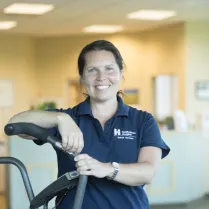What Happens When You're Less Active
Author

Jennifer Logan, Community Exercise and Aquatics Program Manager
When the days get shorter and the colder weather comes, we typically become less active. But how bad is it for you to hibernate all winter?
There are some real consequences to being physically inactive.
It takes about four to six weeks to start losing the benefits of being active, depending on your age, physical condition, and gender.
Some of the changes that happen when you become more sedentary include:
- Slower metabolic rate. When you are less active, it slows down the process by which your body breaks down energy sources for fuel.Over time, a slower metabolic rate can lead to weight gain, fatigue, and a decrease in overall function.
- Changes in your cardiovascular system. When you are inactive, your heart becomes a less efficient pump. This decreases your body’s ability to utilize glucose effectively, which could lead to diabetes, and a decrease in HDL levels (your good cholesterol levels).
- Less muscle mass. Your muscles will atrophy (decrease in muscle fibers and tone) if not regularly used, leading to weakness and potential changes in balance. Use it, or lose it!
So what can you do to stay active in the winter months?
- Start small. Make it a point to stand more at home, or take five to 10 minute breaks from sitting every 20 minutes. Every step makes a difference.
- Take it inside. Consider heading to an indoor venue, such as an indoor shopping mall, and taking a walk. (South Shore Health organizes walking groups at the Hanover Mall and South Shore Plaza.)
- Make it social. It’s important to consider your emotional and mental health during the winter months, too. Plan some social events to help keep you physically active and socially engaged.
- Start an exercise class. Group fitness classes provide a fun, social atmosphere in which to maintain (or improve) your activity level. And it doesn’t have to be expensive—South Shore Health offers dozens of affordable exercise classes for people of all ages, led by experienced and trained instructors.
Being active keeps you independent longer, decreases the risk of cardiovascular disease, osteoporosis, diabetes, chronic pain, obesity, and cognitive changes. So make a plan to stay active during the winter to maintain your wellness.
Interested in an exercise program? Learn more about community exercise programs at South Shore Health.
Author

Jennifer Logan, Community Exercise and Aquatics Program Manager






